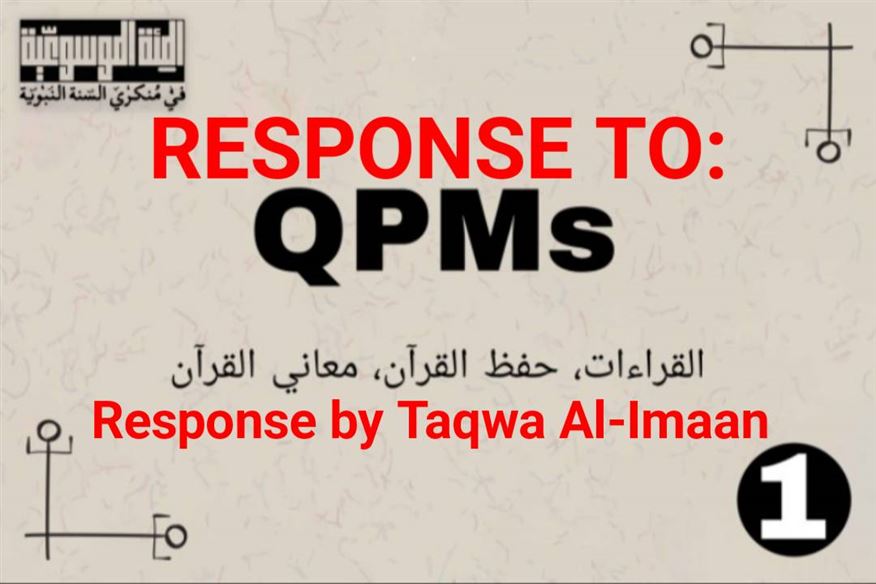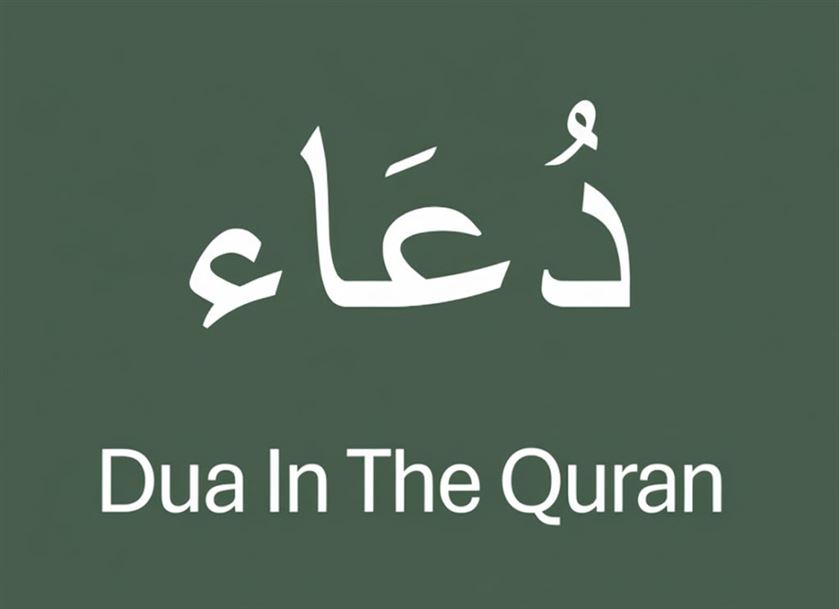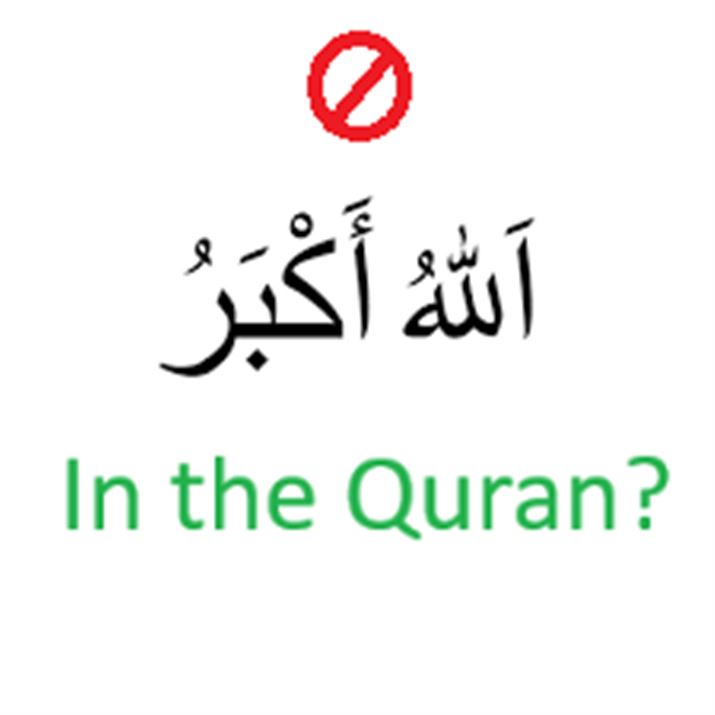A response to the following article by SunnahShield:
https://sunnahshield.wordpress.com/2024/12/10/qpms/
(1) Did the Prophet Muhammad ﷺ receive from Allah ﷻ the Quran as
1- Words Only (go to point 4)
2- Words and Meanings (go to points 2, 3, 4)
3- Meanings only (click off the article)
Loaded question fallacy. The Nabi received the full Qur'an, with internal meanings, the meanings are to be understood from the Qur'an, for that you must use the language of the Qur'an, and for that you must know what language the Qur'an is in, the Qur'an says it is in Lisan Arabiy.
(2) Qiraat
So if he revealed words, which words are these?
for example Allah ﷻ says in Surat Aal Imran (3:146)
False presupposition in this argument against revelation of the Qur'an. Presupposing that there were initially multiple Qira'at and that they are there and still valid.
for example Allah ﷻ says in Surat Aal Imran (3:146)
And how many a prophet [fought and] with him fought many religious scholars. But they never lost assurance due to what afflicted them in the cause of Allah, nor did they weaken or submit. And Allah loves the steadfast.
Qatala (Fought)
Qutila (Got killed)
These qira'at are based on the idea of Aḥruf of the Qur'an, which is based on their fabricated ahadith, that there are 7 Aḥruf in total, that the Nabi received the Aḥruf. The word Aḥruf is plural for Ḥarf, the word Ḥarf means distortion/corruption/mispronunciation, the word Taḥrif is the verb form of Ḥarf, meaning to distort, corrupt or change something from it's original state. They're technically admitting that these other "Aḥruf" are distortive imitations of the real Qur'an which still exists and is preserved. Note: the original Qur'an hasn't been tampered, they have simply made their own separate copies of the Qur'an with some changes, to confuse and distract people, make them doubt the authenticity of the Qur'an.
Qalun, Warsh, Al Bazzi, Qunbul, Ad Duri (from Abu Amr) , As Susi, Ruways and Rawh all read it as “قُتِلَ” (Qutila, Got killed)
and here are Manuscripts supporting this Side
while, Hisham, Ibn Zakwan, Hafs, Shubah, Khalaf, Khalad, Abu Al Harith, Ad Duri (from Al Kasaei), Ibn Wardan, Ibn Jammaz, Ishaq and Idrees All read it as “َقَاتَل” (Qatala, Fought)
and here are Manuscripts supporting this Side
The manuscripts shown for the Qur'an aren't the original Qur'an, we don't know when they are from and if they are even real or recent forgeries, but they are used to create doubt on the real Qur'an, claiming that many things were added to the Qur'an and that the real Qur'an has many things added to it that these manuscripts are missing, or that the real Qur'an has pronunciations and variations (sarf) that are different in the manuscripts. There is no evidence that the Qur'an came down 1,400 years ago to a man in the desert, the Aḥruf manuscripts aren't sufficient evidence, and the dates of them are questionable, the earliest complete manuscript of the real Qur'an we have only dates back to around 4-5 centuries ago, that was physically passed down from generation to generation of Muslims.
so now the question is, which one is it? is it fought or is it got killed, more people recite it as fought, and more manuscripts have it as got killed
you as a Sunnah rejector believe Allah only spoke one of these 2, not both, so which one did he Say
The issue with this argument is that since it claims that قُتِلَ (qutila) means killed and قَاتَلَ (qātala) means fought, it does not take into account that qutila and qātala have the same root and thus the same root definition, and only the verb form differs between the two. Then how do we know which is the correct one? Well, we can determine that based on the verb form and on other words in the same verse, whether they are active or passive.
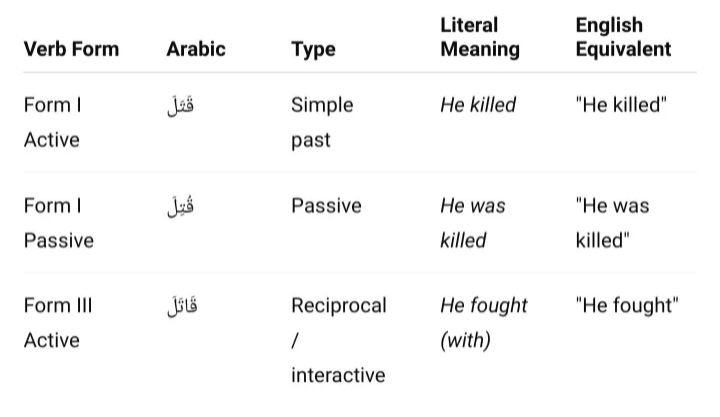
Root: ق-ت-ل (Q-T-L) is the shared root between قَاتَلَ (Qātala) and قُتِلَ (Qutila), which conveys the general idea of killing, fighting or combat. This implies that both forms involve a scenario related to fighting, conflict, or death, therefore the semantic field remains the same, however death in the context of the Qur'an doesn't explicitly imply physical but can also mean an ego death i.e. the death/sacrifice of an inflated/heavy ego to cleanse the soul.
The word قُتِلَ (Qutila) is a third-person singular passive past (perfect) form I verb.
https://en.m.wiktionary.org/wiki/%D9%82%D8%AA%D9%84
The 3rd person perfect past (perfect) passive form I verb is formed using "had been" + past (perfect) participle. For example, "He/She/It had been invited" or "They had been invited".
Past Perfect: Indicates the action completed before another action in the past. It's formed with "had" + past participle.
Passive Voice: The referenced subject receives the action, rather than performing it. It's formed with a past tense form of "be" + past participle.
Third Person: Refers to "he," "she," "it," or "they."
So according to this, if the correct word in 3:146 is supposed قُتِلَ (qutila), then it's saying the Nabi had been killed while the Ribbiyyūn were alongside with him, which doesn't make sense, as this contradicts the fact that Allah refers to them all as the patient ones (ٱلصَّـٰبِرِينَ) in the sense that they are still alive in the narrative given in the verse, since the word ٱلصَّـٰبِرِينَ (As-Sābirīna) is in the active form, قَـٰتَلَ (Qātala) would actually fit better since that is also in the active form with the Nabi as active agent and Ribbiyyūn actively alongside him.
Using قُتِلَ (Qutila) also contradicts 3:144 as it poses a rhetorical question for the deserters with the potentiality that if the Nabi did die or had been killed, will they turn back on their heels i.e. desert after he has died or has been killed, also the word قُتِلَ (qutila) is used here and it's interpreted in the proper manner that the subject mentioned is the receiver and not the doer with this past perfect passive third person participle, while in 3:146 it's usually translated improperly when it's used in place of قَـٰتَلَ (qātala) in the Warsh reading, also, the rhetorical question in 3:144 posits the question for if he is killed, basically negating the idea that he has been killed, and 3:145 also contradicts the usage of قُتِلَ (qutila) in 3:146, as the verse affirm that only can Allah can cause the soul to die when he wills, then the next verse 3:146 is actually continued by the prefixed presumption participle of وَ "wa" (and) and not ثُمَّ "thuma" (then).
The author disingenuously interprets both with the Nabi as the acter, and presumes that it's the meaning that is different between two words, when it's clearly not because the root is the same, the difference is in how the participle is used with the subject.
The problem is that whether or not the Nabi is the acter (qātala) or the receiver (qutila), the author must decide, the author presumes there's a difference in the meaning, but there isn't, it's rather the difference in how the participle is used with the main subject, if the subject is the acter or the receiver.
If the root meaning is "fight", then is it:
1) He fought with (qātala ma'ahu)
OR
2) He has been fought, with (qutila ma'ahu)
If the root meaning is "kill", then is it:
1) He killed (qātala)
OR
2) He has been killed (qutila)
The core definition itself doesn't matter in regards to the verbal difference between qutila and qātala , but who it applies to does matter.
The verb قَـٰتَلَ (Qātala) fits verse 3:146, as it's a reciprocal action, that the Nabi is actively as the subject participating as the doer, and this action shared with plurality of other subjects, the Ribbiyūn who are companions in fighting, but not the primary subject, also Qātala fits as it fits with the the ٱلصَّـٰبِرِينَ (As-Sābirīna) - inclusive of the active subject (the Nabi) and his participants (Ribbiyyūn) - which is also an accusative masculine active participle used as a noun inclusive of Nabi and ٱلصَّـٰبِرِينَ (As-Sābirīna).
https://www.explorearabic.org/form-iii-3-letter-root/
https://ultimatearabic.com/the-doer/
https://corpus.quran.com/wordmorphology.jsp?location=(3:146:4)
https://corpus.quran.com/wordbyword.jsp?chapter=3&verse=146#(3:146:1)
https://corpus.quran.com/treebank.jsp?chapter=3&verse=146&token=4
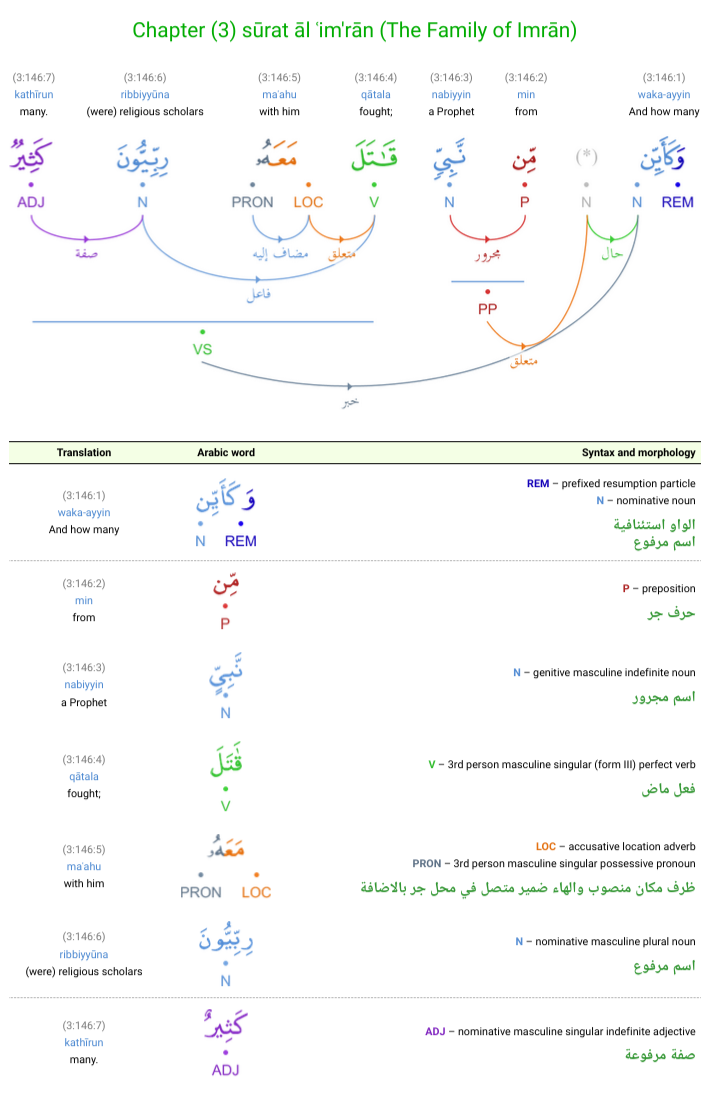
https://corpus.quran.com/documentation/verbforms.jsp
1- if you say you don’t know then you’re following assumptions and doubts, and according to the Quran those who follow doubts are misguided, so you’re misguided
2- if you say it’s “Got killed” based on the fact it has more manuscripts, or if you say it’s “fought” based on the fact more people recite it that way
Allah says in Surat Al Anaam (6:116)
﴿وَإِن تُطِعۡ أَكۡثَرَ مَن فِی ٱلۡأَرۡضِ یُضِلُّوكَ عَن سَبِیلِ ٱللَّهِۚ إِن یَتّبِعُونَ إِلَّا ٱلظَّنَّ وَإِنۡ هُمۡ إِلَّا یخرصونَ﴾ [الأنعام ١١٦] If you obeyed most of those on earth, they would lead you away from the path of God. They follow nothing but speculation; they are merely guessing.
3- if you say it doesn’t matter, let’s agree only one can be true from a Sunnah rejector’s perspective, because you don’t believe in Qiraat since you don’t believe in Hadith, so now you’re saying it doesn’t matter which one is true and which one is false, so you’re basically acknowledging the fact the Quran got corrupted, and this is where the 3rd point in this article comes
Attributed arguments allegedly made by other Muslims, hasn't account for the argument made that Ḥafṣ is evidently(?) the oldest and therefore the most original, although this person has already dismissed that altogether using suspicious ancient manuscripts that allegedly predate Ḥafṣ and contain taḥrīf that contradict to it, thus has already made confirmation bias that Ḥafṣ isn't the oldest original and that the manuscripts are older. As it's also proven which is the correct version, using the verse itself, these listed claims are pointless.
(3) Preservationwho told you the Quran is preserved?
1) some would say “The Quran says it’s preserved in 15:9” that’s a logical fallacy, called circular reasoning, “X is true because X says so”
2) others would say Manuscripts
1- as I showed earlier, the manuscripts differ, so please go back to point 2 and solve it if you want to use manuscripts
2- Not a single Manuscript of the Whole Quran exists from the time of the Prophet Muhammad, only some manuscripts that consist of a few pages, like the Birmingham Manuscript, but that’s about it, yes the Birmingham Manuscript is 100% accurate with the Quran we have now, but it’s just 2 pages
Absence of evidence is not evidence of absence. When did Muhammad live? The author doesn't know, just merely making assumptions. The "manuscripts" could be forged to try and undermine the Qur'an, the oldest extant Qur'an is the Ḥafṣ Qur'an, the oldest extant copy seen is Ḥafṣ.
Going back to this statement
2- if you say it’s “Got killed” based on the fact it has more manuscripts, or if you say it’s “fought” based on the fact more people recite it that wayAllah says in Surat Al Anaam (6:116)
﴿وَإِن تُطِعۡ أَكۡثَرَ مَن فِی ٱلۡأَرۡضِ یُضِلُّوكَ عَن سَبِیلِ ٱللَّهِۚ إِن یَتَّبِعُونَ إِلَّا ٱلظَّنَّ وَإِن هم إِلَّا یَخۡرُصُونَ﴾ [الأنعام ١١٦] If you obeyed most of those on earth, they would lead you away from the path of God. They follow nothing but speculation; they are merely guessing.
The author has hammered the nail in his own feet by quoting this verse, as he himself follows the Ḥafṣ reading primarily because it is what the majority agree upon, and not because of it's Holistic coherency and grammatical accuracy, and acknowledges this verse against following the majority, and so he is doing wrong for believing in something based on the majority aspect.
3- just like you say hadith magically started appearing claiming to be revelation, that means logically another thing can just start appearing claiming to be revelation, so who told you just like people made up Hadith, they didn’t also make up stuff and add it to the Quran, you’d say but Hadith came up 200 years after, even though that’s false, lets assume they started with fabricating the Quran then making up Hadith, what’s the issue with that? can you reach the real author of any Manuscript? nope, you can merely know when it was written and that’s it, and we’re only getting started
Disingenuous argument since no one says that Ahadith just simply started "magically" started appearing claiming to be revelation, it is of the belief that the ahadith were gradually fabricated in the process of their establishment and still remain uncompleted in their process, with constant editing and revision. There is no evidence of when exactly the ahadith started to appear, but there is overwhelming evidence that they never came into existence alongside the Qur'an, but rather over a century later, and why else it is said that they are fabrications and cannot be revelations from Allah, is because they contradict the Qur'an overwhelmingly and that they contain blatant internal contradictions unlike the Qur'an, and that Allah can't contradict himself, so the ahadith books cannot be revelations from Allah as they have too many contradictions within them, and that each narration in these books depends on a chain of narrators and their alleged reliability and trustworthiness, and that those found to be guilty of false testimony even once should never be trusted as witnesses again (Qur'an 24:4). Yet ahadith transmission chains contain such many individuals who are declared to be liars such as Abu Huraira who was publicly accused of false testimony about sayings of the Nabi. How can such narrators be considered reliable sources for the religion?
Additionally, the author has assumed that the Qur'an was transmitted the same way as his ahadith books, however, this is not true, as it is believed that the ahadith began as oral traditions which were written down later with chains of narrators containing names of transmitters, some of who were accused of lying such as Ka'b al Ahbar and Abu Huraira, while the Qur'an began as a written compiled text and then orally recited by the Nabi and his companions. The Qur'an doesn't contain long lists of chains of narrators like the ahadith books, it only ever quotes the origin source directly from time to time, implicitly as facts, without attempting to provide trivial evidence that they are authentic narrations using long lists of chains of narrators tracing back to Nabi Musa, Nabi Yūsuf, Nabi ‘Īsā, etc, only ahadith books do this to plead that they are as authentic as the Qur'an, the Qur'an also doesn't contain a chain of transmission for it's own transmission, since the Qur'an began as a textual medium and was continuously passed down as a textual medium.
3) then others would try to just deny corruption and when there’s no corruption then there’s preservation
so
1- who told you nothing was removed from the Quran?
(you have no answer)
This is a loaded question because no Muslim has ever had to make the claim that nothing has been removed from the Qur'an, because it's logically sensible to believe that nothing can be removed from the Qur'an for a Muslim who believes in the Qur'an who presumes that other Muslims believe the same.
2) who told you nothing was added to the Quran
you’d bring up a few Ayat like
1- 4:82and then claim there are no contractions in the Quran, I would refer you to the Abrogation article, but let’s assume you’re right, not all additions have to contradict, a sentence is either inshaaiyah or khabariyah, contradiction occurs in Khabariyah, not inshaaiyah, so now if let’s say, in Surat Aal Imran (3:33) it says :
﴿۞ إِنَّ ٱللَّهَ ٱصۡطَفَىٰۤ ءَادَمَ وَنُوحࣰا وَءَالَ إِبۡرَ ٰهِیمَ وَءَالَ عِمۡرَ ٰنَ عَلَى ٱلۡعَـٰلَمِینَ﴾ [آل عمران ٣٣]Indeed, Allah chose Adam and Noah and the family of Abraham and the family of ‘Imran over the worlds
what if it said “And Musa” or “And Eisa”
how would that be a contradiction?
The idea that verses were added to the Qur'an is from ahadith books and Rashad Khalifa who got this from ahadith books, regarding the last 2 verses of Surah At-Tawbah 9:128-129. And the rest of the article from here onwards falls off as baatil with useless "what if" scenarios, maybe the author should become a writer for Marvel instead and write "what if" episodes for their "what if" series.
4) others would say that the Quran was written by the Prophet Muhammad ﷺ
oke, show us the copy he wrote, and compare it to what we have now, I’ll wait
so long story short, if you use anything in the Quran to prove the Quran’s preservation, that would be circular, if you use anything outside the Quran to prove the Qur’ans preservation, then you’d be giving authority to Hadith outside the Quran.
The Qur'an implicitly emphasizes that it's the angels who write the Qur'an by the command of Allah, and that the Messenger simply recited from it.
لَقَدْ أَنزَلْنَآ إِلَيْكُمْ كِتَـٰبًا فِيهِ ذِكْرُكُمْ أفَلَا تَعْقِلُونَ
We have sent down to you a Book in which is your Remembrance. Do you not comprehend?
(Quran 21:10)
صٓ وَٱلْقُرْءَانِ ذِى ٱلذِّكْرِ
Ṣād, and the Qur'an that contains the remembrance.
(Quran 38:1)
إِنَّا نَحْنُ نَزَّلْنَا ٱلذِّكْرَ وَإِنَّا لَهُۥ لَحَـٰفِظونَ
We sent down the remembrance, and We are its custodians (Hāfizūn).
(Qur'an 15:9)
Additionally, the "We" in the preservation verse 15:9 is plural, implying that Allah is the one who preserves the Qur'an, not humans, and that since Angels are the ones who wrote it, not humans, as they also write in the records book, they too are part of the process of preservation, as the verse says Ḥāfiz (custodians/keepers) in the plural form, since they were specifically commanded by Allah to write the Qur'an on purified pages (80:11-16).
Regarding the circular reasoning accusation, the Sunnis and Shias are the ones who resort to circular reasoning.
This accusation only applies to ahadith hearsay narrations and so-called living traditions. "The ahadith narrations are the words of the Prophet because the ahadith narrations says so". "This is living tradition is popular because it's authentic, it's authentic because it's popular".
And there is circular logic in anchoring the Qur'an to a certain historical era, as you would need to verify that history too with the Qur'an, which results in circular reasoning.
(4) Now, if Allah ﷻ revealed the Quran as just words, then some Quranic and logical issues would arise.
This is non-argument, since the Qur'an was revealed as full text with internal meanings in the Qur'an as explained initially.
now the Question is Where do Sunnah rejectors get their criteria regarding the Quran?
whether it’s the preservation of the Quran, the corruption of the Quran, the truthfulness of the Quran, the falsehood of the Quran, the Variants of the Quran etc
it’s 1 of 2 things
1) From the Quran
2) From Outside the Quran
if it’s (1) from the Quran, then that would be circular, the Quran says it’s preserved and therefore it is, that’s circular
if it’s (2) then you’d be following things outside the Quran, which is anti Quran alonist
To call Allah's promise of preserving the Qur'an proclaimed in the Qur'an a "circular reasoning" is a kufri argument. Indeed, Muslims who believe the Qur'an is preserved by Allah, must have faith in this statement in the Qur'an, and don't need to resort to the circular argument of "Qur'an is preserved because the Qur'an says so", and thus have certainty in it, and not depend on external books containing over-exaggerated historical assumptions. And therefore, to believe the Qur'an is true, one must also believe that this statement is true, and thus believe that it is truly preserved by Allah, believing the Qur'an to contain a lot of truth leads to the belief the Qur'an is true in it's entirety and thus this also requires believing in the promise of preservation to also be true.
Muslims mainly focus on confirming the validity and accuracy of the Qur'an and not merely it's preservation alone, largely by confirming its claims and arguments, to determine whether or not the Qur'an is the truth and truly is the divine word of Allah, whose existence is proven by logical rhetoric in the Qur'an, in comparison to the arguments for their deities' existence in other religious books such which struggle to explain in what manner "GOD" exists, and books which attempt to refute the existence of The Creator and the Metaphysical origin of Moral values.
There's a lot of historical, scientifical, logical and philosophical facts in the Qur'an, how would the author protest those facts, with nihilism? With NASA science? With theory of evolution? With books of other religions? With his ahadith books? With his arbitrary tafseer books? How?

